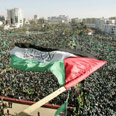
Hamas rally in Gaza (Archive)
Photo: Reuters
The departure and return of the pilgrims to Mecca, the renewed supply of fuel and electricity, the opening of the Rafah crossing, and the enlistment of the masses and some Arab, Islamic, and Western governments to the Palestinian cause – all of the above are credited to, at the end of the day, to Hamas.
Indeed, Hamas is reinforcing its hold under the siege, which is slowly being cracked.
Regardless of whether Mahmoud Abbas spoke with the Israelis or not, regardless of whether Palestinian Authority officials convinced their counterparts in Israel or in the International Quartet – at the end of the day, the latest achievement is credited to Hamas’ and Gaza residents’ determination and “cohesion.”
With the assistance of its own media outlets as well as those in the Arab world, Hamas again proved that it controls a well-oiled machine.
Hamas was able to get people out to the streets with candles, cameras were clicking, rallies were organized across the Arab world with the help of sympathizers and local organizations, Palestinian masses assembled at the Rafah Crossing, and masses blow up the fence, while public opinion could show nothing but understanding.
All of this constitutes yet another layer in entrenching Hamas, its determination, and particularly its Gaza regime, as an existing fact in Palestinian and international public opinion.
However, this entrenchment is the least problematic issue for the Palestinian Authority, Israel, the United States, and the West in general. Hamas has been able to enlist the masses, and in the face of this, its rivals are forced to condemn Israel’s siege and even make an effort to minimize it. It is obvious that any instance of scaling back the siege boosts Haniyeh, Mashaal, al-Zahar, and their partners, and for a moment the reasons for the siege are forgotten.
‘We’re not begging’
Hamas, which already won the Palestinian Authority elections and enjoys much credit in all matters pertaining to Israel’s Gaza Strip withdrawal, is perceived today as a group that is able to cope with Israeli and American pressures and hold steady in the Strip. In addition, Hamas no longer aspires for reconciliation with Mahmoud Abbas and the Palestinian Authority.“We are in favor of dialogue and unity,” Haniyeh, Mashaal, and their colleagues made clear, “but we do not beg for such dialogue.”
In the face of diplomatic negotiations that would only lead to a serious breakthrough if we see a miracle, and in the face of roadblocks that only become more numerous and economic prosperity that can only be seen on television broadcasts from international conferences, the resumption of Fatah’s and Abbas’ dialogue with Hamas is not far. Who even remembers Hamas’ “green revolution” in Gaza? When Fatah and Hamas will be talking again, this will be yet another victory for the greens.
Palestinian Authority officials agree that as long as there is no change in Israel’s approach to negotiations, Hamas will be winning. The problem for the Palestinians is that these victories, for the time being, do not create jobs and apparently will not remove the roadblocks. If this too will happen, Abbas’ way will seem even less realistic. And who will win out then?















